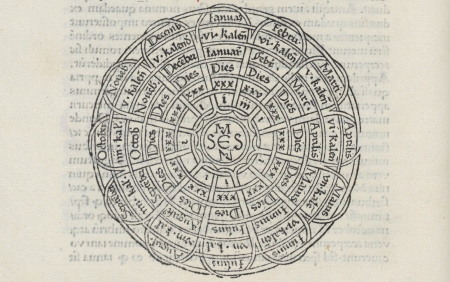
Houghton Library’s extensive holdings in the early history of science represent over 2,000 years of scientific thought. The earliest copies of scientific writing in the collection date from the mid-13th century, but many volumes reproduce the still-earlier work of Greek and Roman natural philosophers.
Greco-Roman mathematicians, logicians, and physicians laid the foundations upon which Western scientific practice was built, and Houghton’s holdings reflect the longstanding influence of their work.

For instance, Houghton’s volumes of Euclid’s Elements include:
- a copy from 1482, the first year the book was set in type,
- over 40 16th-century copies in 10 different languages, and
- nearly 50 different editions from the following centuries.
This abundance is a testament to the work’s status as the most popular textbook of all time.
The work of Archimedes, another giant in the history of mathematics, is similarly preserved in numerous late-Renaissance editions.
No figure of antiquity had a greater influence over the course of scientific thought than Aristotle, the first philosopher to offer a formal analysis of logic and the author of important work in biology, zoology, and physics. Aristotle’s treatments of these subjects are recorded in three 13th- to 14th-century manuscripts in the collection, as well as many incunabula and later manuscripts.
Physicians of the Greco-Roman world established medicine as an independent discipline, and a 1430 collection of Hippocratic remedies and more than a dozen incunabula indicate the great authority Hippocrates, Celsus, and Galen retained throughout the medieval and early Renaissance period. Their status in medical science mirrors that of Claudius Ptolemy in astronomy.
The legacy of this Greco-Egyptian polymath, whose view of the cosmos effectively underpinned all medieval astronomy, is splendidly captured in Houghton’s 1400–1415 decorated manuscript of his Cosmographia. This volume is especially interesting because it features annotations by Poggio Bracciolini, the early Italian humanist whose recovery of many classical manuscripts greatly contributed to Renaissance intellectual achievements.
In the period stretching from the end of antiquity to the High Middle Ages, Islamic scholars were the most important source of scientific and mathematical innovation. Their work is well represented in Houghton’s collection. Among others, the writings of the astronomers Ibn al-Haytham and Ibn Jabir Battani, of the physician Ibn Sina, and of the polymath Ibn Musaal-Kwarizmi (who established the discipline of algebra) are all preserved in manuscript form.
As scientific thinking began to take root in Europe, around the 13th century, scholastics such as Robert Grosseteste, Roger Bacon, and Albertus Magnus were inspired by their Islamic predecessors. In an early (1255–1276) manuscript in Houghton’s collection, an essay of Grosseteste’s is bound with work by Al-Kwarizmi and two other Islamic astronomers: a physical connection that mirrors the scholastics’ intellectual proximity to the Islamic scholars whose ideas they sought to build upon.
The 1347 arrival of the Black Death in Europe slowed the pace of scientific progress, but the work of these medieval scholars helped to set the stage for the scientific revolution of the 16th to 18th centuries.
Accessing These Materials
Houghton's history of science collections are cataloged in HOLLIS. Please contact the library if we can offer any assistance in finding materials.